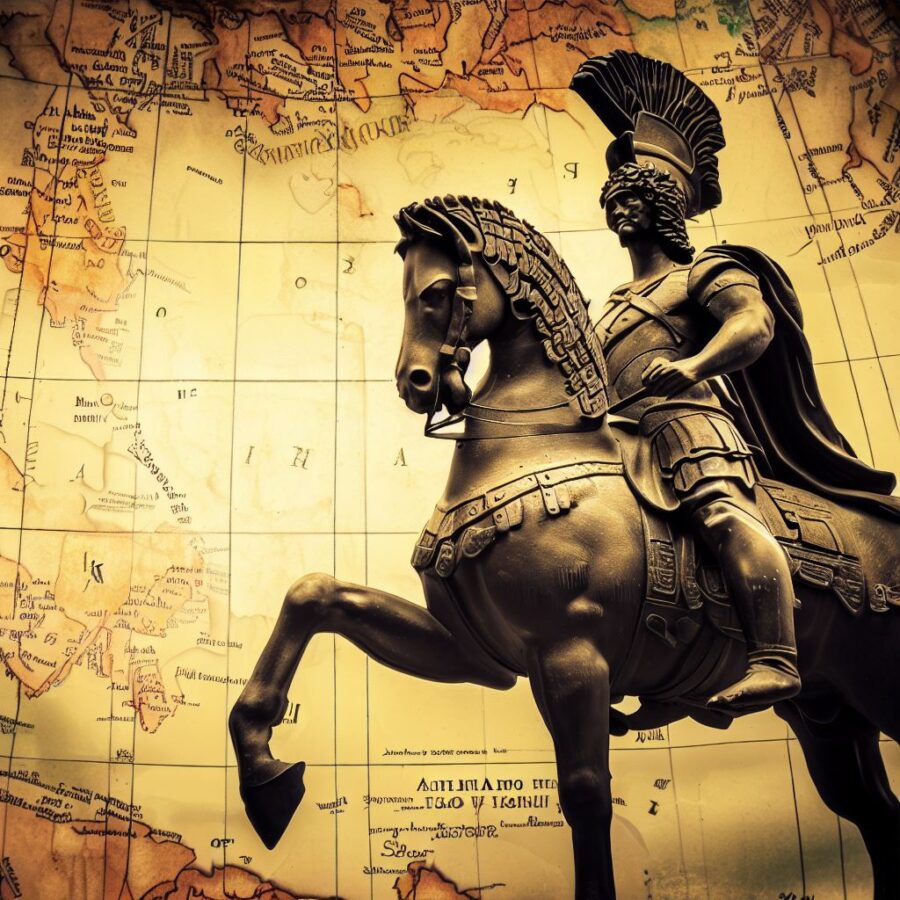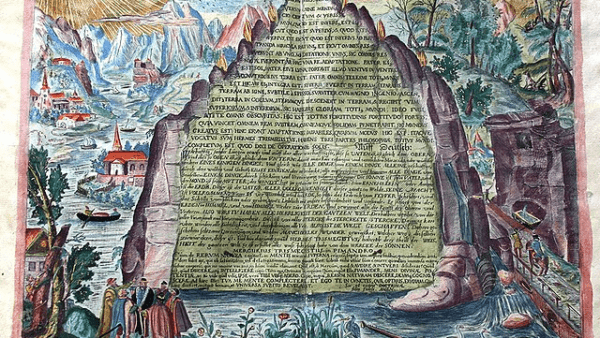Alexander the Great
The origins of Alexander the Great are firmly rooted in a noble lineage that stretches back through the annals of history. Born in 356 BC in Pella, the capital of the ancient kingdom of Macedon, Alexander inherited a legacy steeped in greatness. His father, King Philip II, was known for his military genius and ambitious vision of expanding the Macedonian empire.
From an early age, Alexander displayed a remarkable intellect and natural leadership abilities, traits undoubtedly fueled by the extraordinary bloodline coursing through his veins. His mother, Olympias, was of royal Epirus descent, tracing her lineage back to the mighty Achilles of Greek mythology. With such ancestry, it is no wonder that Alexander embodied the essence of greatness from the very beginning. His illustrious origins laid the foundation for a life marked by triumph and conquest, propelling him towards his future destiny as one of history’s most legendary figures.
A Royal Upbringing: Alexander’s Early Years in the Court of Macedon
Alexander the Great’s early life was marked by a royal upbringing in the magnificent court of Macedon. Born in 356 BCE, he was the son of King Philip II and Queen Olympias, both of noble bloodlines. From the very beginning, it was evident that Alexander possessed an exceptional destiny. Surrounded by opulence and grandeur, he grew up in a world where power and influence were the norm.
The court of Macedon was renowned for its intellectual and artistic achievements, with prominent scholars and philosophers like Aristotle imparting their wisdom to the young prince. Alexander’s education was shaped not only by the principles of governance but also by the cultural richness of the court. He learned not only the art of war but also language, literature, and philosophy.
This early exposure to diverse intellectual pursuits sowed the seeds of his brilliance and instilled in him an insatiable thirst for knowledge. Gifted with a sharp and analytical mind, he absorbed everything like a sponge, displaying a prodigious curiosity that set him apart from his peers. It is from this environment of utmost refinement that Alexander drew his inspiration, preparing him for the extraordinary journey that lay ahead.
The Influence of Aristotle: Alexander’s Education and Intellectual Development
Alexander’s education and intellectual development were greatly influenced by the renowned philosopher Aristotle. Under the tutelage of Aristotle, Alexander was introduced to a world of knowledge and wisdom that would shape his understanding of the world and his role in it. Aristotle not only taught Alexander various academic disciplines, but also instilled in him a love for learning and a thirst for knowledge.
The intellectual stimulation provided by Aristotle allowed Alexander to develop critical thinking skills, as well as a deep appreciation for philosophy, literature, and the arts. This foundation in education equipped Alexander with the tools necessary to become the great leader and military strategist that he would later become. Aristotle’s profound influence on Alexander’s early life is evident in the extraordinary achievements he would go on to accomplish.
The Battle of Chaeronea: Alexander’s First Taste of Military Glory
The Battle of Chaeronea stands as a pivotal moment in the story of Alexander the Great. Marking his first taste of military glory and foreshadowing the breathtaking conquests that were to come. It was a true test of his abilities. And he rose to the occasion with a greatness that would define his legacy.
At only 18 years old, Alexander led a contingent of the Macedonian army, standing alongside his father, King Philip II. The young prince had inherited his father’s military brilliance, and his strategic mind quickly emerged on the battlefield. With unwavering courage and tactical ingenuity, Alexander orchestrated a decisive victory against the formidable forces of the Thebans and Athenians.
This triumph showcased not only his innate leadership qualities but also his ability to inspire and command the loyalty of his troops. The battle of Chaeronea lit a fire in Alexander’s heart. Fueling his ambition to become a conqueror and ensuring that his name would go down in history as one of the greatest military minds of all time.
The Tutelage of Philip II: Alexander’s Training as a Future King and Commander
One of the most crucial aspects of Alexander the Great’s upbringing was his tutelage under his father, Philip II. Alexander received a comprehensive education that would shape his skills and character for years to come. Under Philip’s watchful guidance, he exposed Alexander to various subjects, including philosophy, literature, and mathematics. Such a education prepared him not only for the challenges of ruling an empire but also for the art of warfare.
Philip, recognizing Alexander’s immense potential, encouraged his son’s natural curiosity and thirst for knowledge. Fostering an environment of intellectual growth and greatness. This early training instilled in Alexander a profound sense of duty, leadership, and strategic thinking. Setting him on his path to become one of history’s greatest conquerors.
The Persian Connection: Alexander’s Fascination with the East and His Ambitions
One cannot delve into the origins and early life of Alexander the Great without acknowledging his deep fascination with the East and his ambitious aspirations. From an early age, Alexander showed an unparalleled curiosity for the ways of the Persian Empire.
His exposure to Persian customs and traditions through his tutor, Aristotle. Awakened a passion within him for the rich and diverse cultures that thrived in the East. As he grew older, this fascination only intensified, fueling his desire to conquer these lands and become a leader whose magnificence matched that of the legendary Persian kings. Alexander’s heritage acted as an indelible thread connecting him to the East, for he hailed from the noble lineage of the Macedonian dynasty that claimed an ancient Persian ancestry.
This familial connection further emboldened his grand visions, as he sought to unite the East and the West under his rule. Binding together two vast worlds in harmony. With unwavering determination and an unwavering belief in his destiny. Alexander embarked on a quest to assert his greatness. A legacy forever intertwining with the glorious origins from which he sprang.
The Macedonian Army: Alexander’s Early Military Experiences and Leadership Skills
From an early age, Alexander the Great had a burning passion for military strategy and warfare. His initiation into the world of military affairs began under the guidance of his father, King Philip II of Macedon.
As a prince, he received the finest education, including rigorous training in both academic and physical pursuits. But it was in the Macedonian army’s ranks that he truly thrived, honing his skills as a warrior and leader. Alexander quickly proved himself to be a natural-born leader, exhibiting extraordinary courage and tactical brilliance on the battlefield. His early military experiences shaped his character, instilling in him a sense of discipline, loyalty, and unwavering determination.
Through his undeniable charisma and ability to inspire others, he fostered a deep sense of camaraderie among his troops. His soldiers revered him not only as their commander but also as a true comrade. Willing to fight alongside them in the most perilous situations. It is no wonder that Alexander the Great would go on to achieve greatness in the world of military conquest.
The Gordian Knot: Alexander’s Legendary Act of Courage and Determination
Alexander the Great displayed his legendary act of courage and determination through the famous tale of unraveling the Gordian Knot. This event not only showcases his exceptional character, but also further solidifies his greatness.
The Gordian Knot, an intricate and tightly bound knot believed to be impossible to untie. Represented the complex challenges and obstacles that Alexander would face on his journey to greatness. With his propensity for boldness and ingenious thinking. Alexander fearlessly approached the knot and, defying conventional methods, swiftly sliced through it with his sword.
His audacity and refusal to be hindered by conventional restraints were symbolized by this act. It revealed that he was a man undeterred by the seemingly insurmountable, willing to face any challenge head-on. Thus, the Gordian Knot event not only showcased Alexander’s courageous nature. But also demonstrated his exceptional ability to overcome any hurdle that stood in his way.

Originally posted 2023-09-26 08:36:16.




